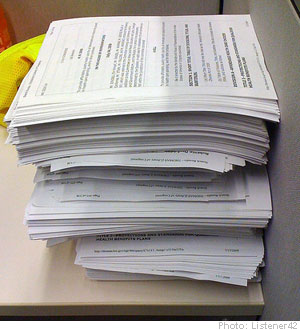 It was just about a month ago that Bruce Barlett noted that the health care bill then being considered by the Senate was close to 2000 pages long and that those who insisted members of Congress read every page didn’t understand how bill drafting worked (I’m being kind here but just work with me).
It was just about a month ago that Bruce Barlett noted that the health care bill then being considered by the Senate was close to 2000 pages long and that those who insisted members of Congress read every page didn’t understand how bill drafting worked (I’m being kind here but just work with me).
Those of you who were critical of that bill because of its length seem to forget that you similarly criticized TARP for being too short. The original version of TARP drafted by Bush Treasury Secretary Hank Paulson that was sent to Capital Hill was slightly less than 3 pages using what I think was 14 point type and at least double spacing.
And it was projected to cost about $233 billion per page, that is, $700 billion and said the little more than “Give us the money get out of our face.”
As enacted, TARP was more than 10 times longer than what Paulson requested, largely because it added a number of oversight procedures and triggers. The total cost was the same but the cost-per-page fell to around $17 billion.
Was $17 billion per page a better deal for taxpayers?
The bill that emerges from the Senate on health care will be far more complicated than TARP. It will, after all, be dealing with about 17 percent of GDP and will affect virtually everyone living in the U.S.. It will also be printed in the same 14 point, double-spaced style as all legislation. And depending on whether the bill is drafted as an amendment to what is already being debated or as new standalone legislation, it may have to start by striking out the original and then substituting new language. In other words, it could end up being closer to 4000 pages not because its more complicated but because that’s standard legislative drafting procedure.
If you’re having trouble getting your mind around this concept, think of it as the difference between the formal way you were taught to speak in school when you were learing a foreign language and how you’re more likely to say the same thing now.
In other words, instead of saying:
“Good morning. I hope you slept well. What are your plans for the rest of the day?”
You probably say something like:
“What’s up?”
In other words, unless you want to speak like you first Spanish or French teacher, you absolutely need to resist the urge to criticize health care reform because of the number of pages in the draft legislation.
- Bulenox: Get 45% to 91% OFF ... Use Discount Code: UNO
- Risk Our Money Not Yours | Get 50% to 90% OFF ... Use Discount Code: MMBVBKSM
Disclaimer: This page contains affiliate links. If you choose to make a purchase after clicking a link, we may receive a commission at no additional cost to you. Thank you for your support!



Leave a Reply